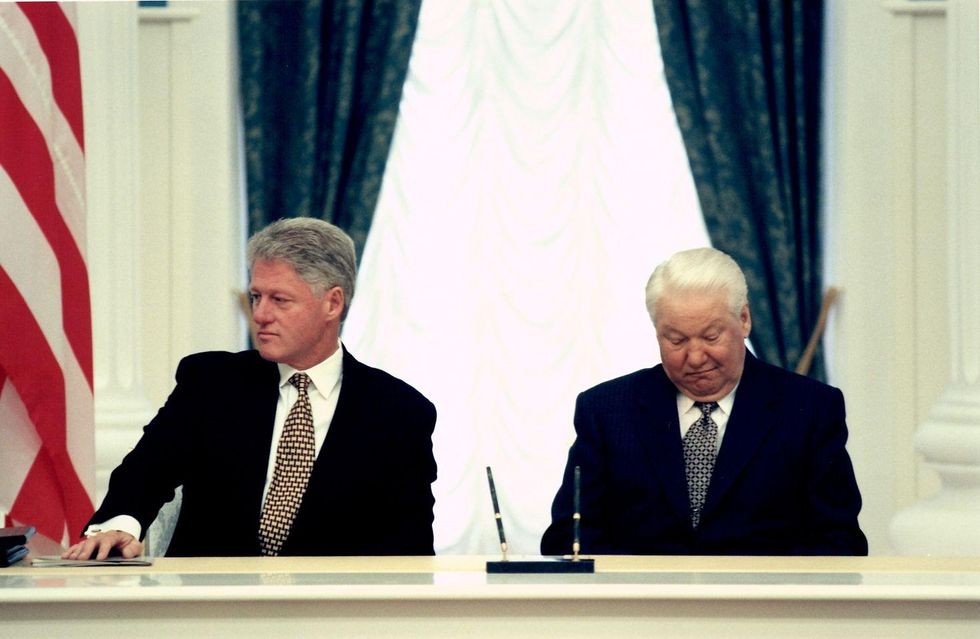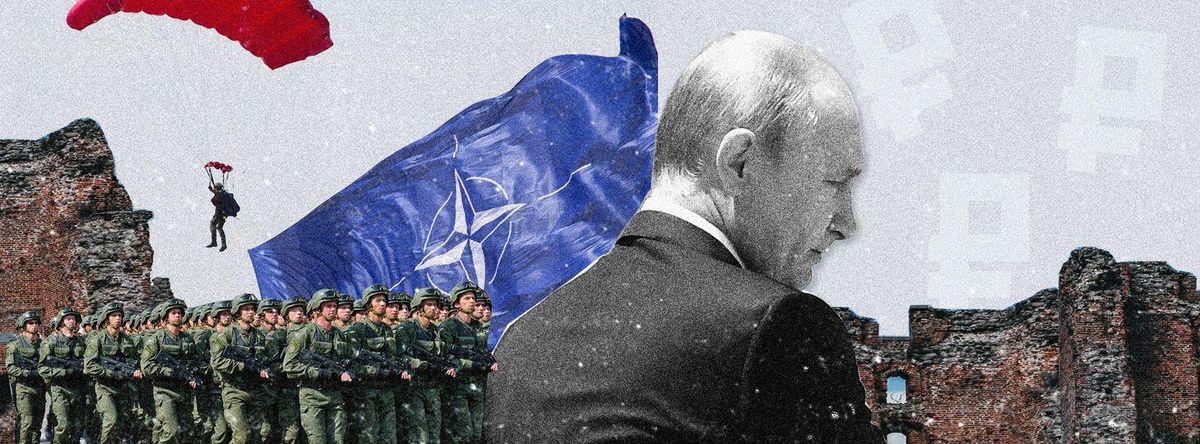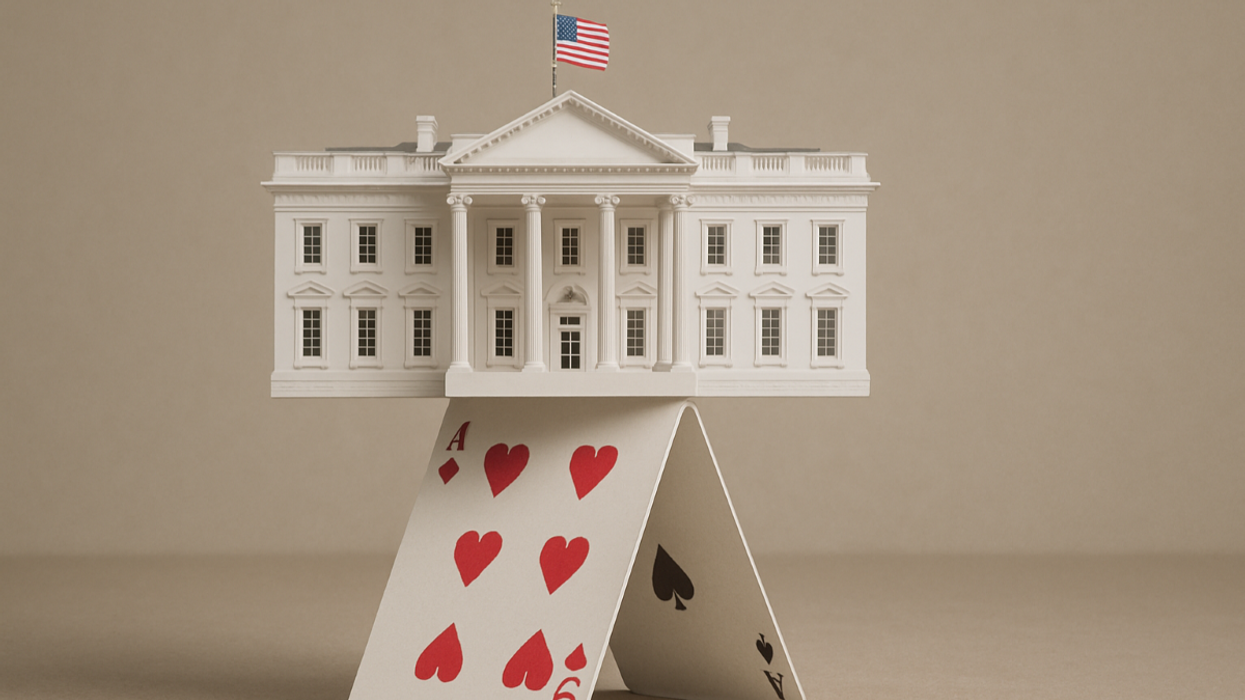More than a month into Russia’s invasion of Ukraine, it’s important to take stock of how we got here.
The easy answer: President Vladimir Putin singlehandedly decided to start a war in an evil and crazed attempt to subjugate an innocent neighbor that posed no threat to his country or his regime, other than by setting an example of what a successful, democratic former Soviet republic could look like.
That is undoubtedly true. President Putin bears 100% of the blame for this war.
Not the Ukrainian government, which contrary to Putin’s claims did not commit acts of genocide against ethnic Russians in the Donbas. Not the West, which despite what Putin and certain foreign policy scholars say did not threaten Russia’s security with NATO enlargement.
Make no mistake, this isn’t a just war or a defensive war. It’s a war of choice, a war of aggression. Putin, and Putin alone, is responsible for it.
But what historical and geopolitical circumstances made this war possible (albeit not inevitable) in the first place? To answer that, we can’t just talk about Putin’s actions—we have to talk about the West’s, too. Not to justify Putin’s destructive behavior but to understand it, to hold ourselves accountable for our role in the crisis, and to prevent us from making the same mistakes again in the future.
Want to understand the world a little better? Subscribe to GZERO Daily by Ian Bremmer for free and get new posts delivered to your inbox every week.The West left Russia behind
Once the Soviet Union collapsed and the Cold War ended, Central and Eastern European states that were previously in the Warsaw Pact were welcomed with open arms into the West, with most eventually joining the European Union and NATO. Integration with the global economy allowed these countries to transition to democratic market economies and achieve high levels of economic development within a single generation. Just look at Poland, which went from communist wasteland to growth miracle in less than 30 years. Meanwhile, NATO membership freed these countries from the instability and insecurity they had historically faced.
What did Russia get? Shock therapy. Privatization. A little bit of economic aid, but not nearly enough and most of it stolen by the new oligarchs privatization had created. There was no Marshall Plan for the reconstruction of Russia. There was no real Western effort to integrate Russia into the US-led global order, even though Russia’s first post-war president Boris Yeltsin was eager to draw closer to the West.

This was a huge missed opportunity. Just as the Marshall Plan served to prevent the spread of communism in Europe, our best bet to permanently lower the odds of conflict with Russia in the future was to integrate it fully into global institutions and give it a proper stake in the European security architecture. Helping Russia flourish was in the West’s self-interest.
But instead of trying to help it transition to a democratic market economy and making its prosperity, partnership, and cooperation a top priority like they did (successfully) with the defeated Germans and Japanese after World War II, Americans and Europeans mostly ignored Russia. They had just won the Cold War without firing a single shot, so they figured they were playing with house money. Why spend any of the newfound peace dividend to help Russia succeed? After all, the Soviet Union had just spent the better part of the 20th century fighting the West; it wasn’t on us to make sure the Russians landed on their feet, and the inexorable pull of democratization and globalization would surely lead them there eventually, anyway. Or at least that’s what many in the foreign policy establishment thought.
They were wrong. There is nothing automatic about democratization and liberalization. This miscalculation led the West to squander a historic chance to turn Russia into another post-war Germany or Japan. As a result, we are now facing a nuclear-armed kleptocratic dictatorship with imperial designs and a chip on its shoulder.
The West ignored Russia’s grievances
Russians spent the 1990s and early 2000s watching the US shape the terms of the post-Cold War order as it pleased while they stood by, powerless to claim what they saw as their rightful role as their neighbors and erstwhile vassal states one by one joined the EU and NATO.
This was humiliating to Russia, not least because it believes that in 1990 Western leaders promised Moscow that NATO would expand “not one inch” eastward beyond Germany’s borders. According to Putin, the Soviet Union only agreed to German reunification and to the end of the Cold War because NATO had committed not to admit any members of the former Soviet bloc. The West has always disputed that there was ever a binding promise not to expand, instead maintaining that NATO has an “open-door” policy allowing any European country that meets the pact’s membership criteria to join. However, it was clear since the mid-1990s that the Russians took the alleged promise seriously.
In Russia’s view, the West betrayed its pledge when it invited the Czech Republic, Poland, and Hungary to join NATO in 1997, and then added insult to injury when it admitted the Baltic states in 2004. Back then, Russia was too weak to do anything about it. But in 2008, when NATO declared that Georgia and Ukraine would eventually become members, Putin drew a “red line” as he viewed this prospect as a direct threat to Russia’s security.Russians spent the 1990s and early 2000s watching the US shape the terms of the post-Cold War order as it pleased while they stood by, powerless to claim what they saw as their rightful role as their neighbors and erstwhile vassal states one by one joined the EU and NATO.
This was humiliating to Russia, not least because it believes that in 1990 Western leaders promised Moscow that NATO would expand “not one inch” eastward beyond Germany’s borders. According to Putin, the Soviet Union only agreed to German reunification and to the end of the Cold War because NATO had committed not to admit any members of the former Soviet bloc. The West has always disputed that there was ever a binding promise not to expand, instead maintaining that NATO has an “open-door” policy allowing any European country that meets the pact’s membership criteria to join. However, it was clear since the mid-1990s that the Russians took the alleged promise seriously.
In Russia’s view, the West betrayed its pledge when it invited the Czech Republic, Poland, and Hungary to join NATO in 1997, and then added insult to injury when it admitted the Baltic states in 2004. Back then, Russia was too weak to do anything about it. But in 2008, when NATO declared that Georgia and Ukraine would eventually become members, Putin drew a “red line” as he viewed this prospect as a direct threat to Russia’s security.Ultimately, while it was the Eastern European nations themselves that demanded to join NATO and the EU, it was the West’s failure to meaningfully include Russia in the European security architecture (of which Russia is undeniably a stakeholder) and to anticipate Russia’s reaction to enlargement that fed Russia’s already-high sense of insecurity and contributed to the current crisis.
The West failed to respond to prior Russian aggressionWhen Russia invaded Georgia in August 2008, partly in response to the Bucharest Declaration’s promise that the country would one day join NATO, the West did nothing. There was no massive international outcry, no crippling economic sanctions imposed against Russia, no advanced weapons systems delivered to Georgia.
When Russia then invaded eastern Ukraine and annexed Crimea in 2014, the West did little. Some limited sanctions and military aid, but not nearly enough to change the course of the war or alter Putin’s calculus. This inaction was also a breach of a promise the US made in 1994 along with the United Kingdom and Russia to defend Ukraine’s territorial integrity—a promise that got Ukraine to give up its nuclear weapons and make itself vulnerable to aggression in the first place.
By failing to act forcefully in 2008 and 2014, the West gave Russia good reasons to believe that it could get away with invading Ukraine a second time.
The West set a bad exampleRussia witnessed America’s lawless behavior in Kosovo, Iraq, and Afghanistan and drew the conclusion that despite high-minded Western talk about the importance of international law, might still makes right.
America’s recognition of Kosovo’s independence may have been justified from a human rights perspective, but it was a breach of international law. In fact, Russia borrowed a lot of the language used by the US to justify the Kosovo decision when it annexed Crimea in 2014. Iraq and Afghanistan were wars of choice started by the US and its allies and plagued with illegality.
This is not to say that Putin’s invasion of Ukraine, a democratic country whose only crime was to demand sovereignty and self-determination, is in any way morally equivalent to America’s war in Afghanistan, a brutal regime under the Taliban theocracy that harbored Osama bin Laden, or in Iraq, which under Saddam Hussein invaded Kuwait and committed horrific human rights abuses. Objectionable and unjust as these American wars were, they are not comparable to what Russia is doing right now to Ukraine. Still, the West’s repeated failure to hold itself to its own standards further emboldened Russia to act in disregard for international law, in 2008, in 2014, and today.
To be clear, none of this absolves Vladimir Putin of moral responsibility for Russia’s bloody attack on Ukraine. The West may have made choices that contributed to the emergence of this crisis, but nothing it did or didn’t do forced Putin’s hand. The blame lies entirely with him.
🔔 And if you haven't already, don't forget to subscribe to my free newsletter, GZERO Daily by Ian Bremmer, to get new posts delivered to your inbox.



















